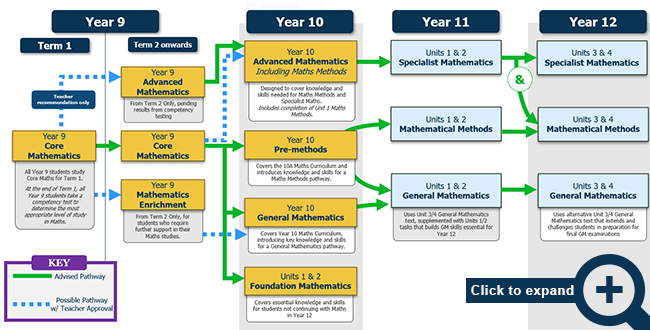Mathematical Methods
Year 11 - Elective
Mathematical Methods Units 1 and 2 provides an introductory study of functions, algebra, calculus, probability and statistics and their applications in a variety of practical and theoretical contexts.
In undertaking these units, students are expected to be able to apply techniques, routines and processes involving rational and real arithmetic, functions, algebraic manipulation, equations, graphs, differentiation, anti-differentiation and integration. They should have facility with relevant by-hand approaches, as well as the use of numerical, graphical and symbolic functionality of technology (CAS calculator) for learning mathematics and for working mathematically.
This course is designed for students with a strong grasp of algebra and who may have an interest in tertiary studies requiring significant mathematical skills or where Mathematical Methods Units 3 and 4 are pre-requisites. The entire course material is assumed knowledge for progression to Mathematical Methods Units 3 and 4.
Planning your VCE Mathematics
Curriculum focus
Unit 1 comprises of the topics
Graphs and Functions
Polynomials
Probability
Circular Functions
Rates of Change
Unit 2 comprises of the topics
Exponential and Logarithmic Functions
Differential Calculus
Integration
Probability Distributions
Assessment
The award of satisfactory completion for a unit is based on whether the student has demonstrated the set of outcomes specified. Teachers use a variety of learning activities and assessment tasks to provide a range of opportunities for students to demonstrate the key knowledge and key skills in the outcomes.
Outcome 1: define and explain key concepts as specified in the content from the areas of study and apply a range of related mathematical routines and procedures.
Outcome 2: apply mathematical processes in non-routine context, including situations with some open-ended aspects requiring investigative, modelling or problem-solving techniques or approaches, and analyse and discuss these applications of mathematics.
Outcome 3: apply computational thinking an use numerical, graphical, symbolic and statistical functionalities of technology to develop mathematical ideas, produce results and carry out analysis in situations requiring investigative, modelling or problem-solving techniques or approaches.
The award of grades and scores for the course is based on the achievement from learning and assessment items throughout the course, such as the mathematical investigation, assignments, tests, summary notes, group work and set questions.
Links
For more detailed information, please click on the link/s below:
Key Resource
Cambridge Mathematical Methods VCE Units 1&2 Second Edition (print and digital)
Casio Classpad 400 FX-CP400 with padded wallet
